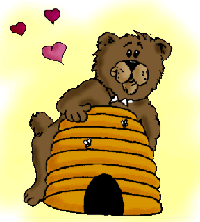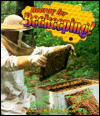
Finders
Keepers 
Duration: 2 hour periods
Objectives:
w The student uses technology resources to find information.
w
The student recognizes the need for different types of jobs in a
community.
w
The student recognizes importance beekeeping for the mass
production of honey.
Materials:
 Hooray for
Beekeeping,
Hooray for
Beekeeping,
About
the book
Where would we be
without farms? Bobbie Kalman's
exciting new series is a celebration of farming,
livestock, crops, and the people who make it all happen. The necessity of farms,
the wide variety that exist, farmers' busy timetables, and environmental
concerns are some of the topics covered in these simple but comprehensive books.
Children will be captivated by the full-color pictures and illustrations of
farming techniques, animals, tools, and powerful machinery. Put on your
coveralls, and let Bobbie Kalman take you on a tour of the farm!
Vocabulary:
apiculture, hive, super, smoker, veil, gloves, feeders
Glossaries: Bee Keeping Equipment
Activities:
1. Review the activities grandpa did to get honey in The Bee Tree.
2. Read Book Hooray for Beekeeping
3. Discuss the job of the beekeeper and the tools needed to do the
job.
4. Discuss the importance of his job for the economy.
FYI: while foraging for nectar and pollen, bees inadvertently transfer pollen from the male to the female components of flowers. Each year, bees pollinate 95 crops worth an estimated $10 billion in the U.S. alone. Insect pollinators contribute to one-third of the world's diet. Beekeepers help out by making more hives for bees to pollinate.
5. Read further about beekeeping at Big Chalk :teachers: librarian
6. Compare and contrast grandpas hunt for honey in The Bee Tree
with that
of a real life beekeeper.
7. Write an expository to explain what a beekeeper does, the tools
he
uses and why a beekeeper's job is important to our world.
Assessment:
w Written comparison between grandpa and real beekeeper
w Written report on a beekeepers job and its importance.
w Written report on the biography of a beekeeper.
Beekeeping for beginners
Home Learning:
The student will search the internet or library to pick a famous beekeeper.
Write a report on the beekeeper telling the following:
The name, country, year, what they discovered or invented and other pertinent information about the person.
Extension:
Contact a local beekeeper and have him/her talk about beekeeping experiences.